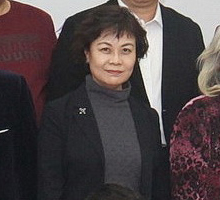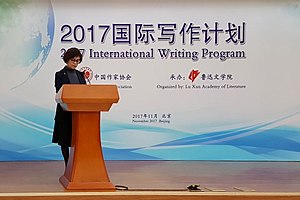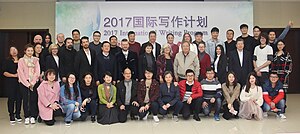

Tie Ning
| |||||||
|---|---|---|---|---|---|---|---|

Tie in Beijing, 2017
| |||||||
| Born | September 1957 (age 66) Beijing, China | ||||||
| Occupation | Novelist, politician | ||||||
| Language | Chinese | ||||||
| Alma mater | Baoding 11th High School | ||||||
| Period | 1975–present | ||||||
| Genre | Novels, short stories | ||||||
| Notable works | Ah, Xiangxue How Long is Forever Wheat Straw Stack | ||||||
| Notable awards | Zhuang Zhongwen Literary Prize 1993 Lu Xun Literary Prize 1997 Lao She Literary Award 2002 Bing Xin Prose Award 2002 2005 | ||||||
| Spouse | Hua Sheng (华生) | ||||||
| Relatives | Father: Tie Yang (铁扬) | ||||||
| Chinese name | |||||||
| Traditional Chinese | 鐵凝 | ||||||
| Simplified Chinese | 铁凝 | ||||||
| |||||||


Tie Ning (born September 1957) is a Chinese author based in Beijing, China. She has, since 2006, been the president of the China Writers Association and is a member of the 18th Central Committee of the Chinese Communist Party. Her works include short stories, "Ah, Xiangxue" (Chinese: 哦,香雪), The Red Shirt Without Buttons (Chinese: 沒有紐扣的紅襯衫), "June's Big Topic" (Chinese: 六月的話題), Wheat Straw Stack (Chinese: 麥秸垛), Cotton Stack (Chinese: 棉花垛), "The Village Road Takes Me Home", Rose Door (Chinese: 玫瑰門), "How Long is Forever" (Chinese: 永遠有多遠) and Da Yu Nü (Chinese: 大浴女) (Big-Bath Woman).
On 10 March 2023, Tie was elected as Vice Chairwoman of the Standing Committee of the 14th National People's Congress.
Tie Ning traces her ancestry to Hebei province. In 1975, after graduation from high school in Baoding, Tie Ning went to Hebei Province to experience rural life. In 1979, she returned to Baoding and worked in the Baoding Branch of the Chinese Federation of Art and Literature as novel editor. In 1984, she worked in the Creative Writing Workshop of Hebei. Now she is the chairperson of the Writers Association of China, a position no woman had ever held before.[1] On 4 December 2016 Tie Ning was subsequently elected as chairwoman of the China Federation of Literary and Art Circles, replacing Sun Jiazheng, in addition to being reelected as chairperson of the Writers Association of China.[2]
Tie Ning started publishing her works in 1975. In 1982, her short story "Ah, Xiangxue" (Chinese: 哦,香雪) won a national award. In 1984, her medium-length novel The Red Shirt Without Buttons (Chinese: 沒有紐扣的紅襯衫) and her short story "June's Big Topic" (Chinese: 六月的話題) won national awards. Since 1980, Tie Ning has published Path in the Night and other collections of short stories and novellas. Her Wheat Straw Stack (Chinese: 麥秸垛) won an award as the 1986/1987 "Middle-length Novel Offprint" (Chinese: 中篇小說選刊). She won the Lao She Literary Award in 2000 and 2002. In 2015, Tie Ning was made the Ordre des Arts et des Lettres.[3]
This section of a biography of a living person does not include any references or sources. Please help by adding reliable sources. Contentious material about living people that is unsourced or poorly sourced must be removed immediately.
Find sources: "Tie Ning" – news · newspapers · books · scholar · JSTOR (September 2023) (Learn how and when to remove this message) |
Her early works mainly depicted ordinary people and daily life, exquisitely portraying her characters' inner worlds, and reflecting people's dreams and pursuits and the absurdity and suffering in their lives.
In 1986 and 1988, she published two novels, Wheat Straw Stack (Chinese: 麥秸垛) and Cotton Stack (Chinese: 棉花垛) respectively, both reflecting ancient history and culture and dealing with women's experiences. After 1986, her novels changed direction to reflection on traditional Chinese cultures, with polysemous themes and varied techniques. In 1988, she wrote her first full-length novel, Rose Door (Chinese: 玫瑰門), in which she departed from her harmonious and idealistic poetic style, and displayed the dark side of life through the competition for survival among women of several generations.
This section of a biography of a living person does not include any references or sources. Please help by adding reliable sources. Contentious material about living people that is unsourced or poorly sourced must be removed immediately.
Find sources: "Tie Ning" – news · newspapers · books · scholar · JSTOR (September 2023) (Learn how and when to remove this message) |
This is a story about an innocent country girl, Xiangxue, "fragrant snow" in Chinese. Xiangxue lives in a village in the mountains. Every day, a train from outside the mountains stops at the village just for a minute. Xiangxue and other country girls each take a small basket of eggs to the train when it stops and exchange them for things they want that they cannot get in the village. Xiangxue carries the basket onto the train, and when she sees a pencil box beside a city girl of her age, she immediately wants it. She offers her for it a full basket of eggs; the exchange is made. It opens up a door to the outside world for her. The story shows the country girl's simplicity and her yearning for civilization.
Tie Ning is critical of the masculine model as a basis for thought about opposition to the power of the party or state and for assuming responsibility over women's lives. This model is embodied in two male characters who both want to marry the female protagonist because they feel responsible for her earlier marriage to a peasant, which left her a widow and prevented her from returning to the city after the policy of sending educated youths to rural China ended.
In her story about the female protagonist's choice between the two, which entails the significant and ideologically loaded choice between the city and the countryside, Tie Ning reveals the complicity of the masculine model in the party's and state's dominant ideology, despite its apparent opposition to it. In its place, she offers the protagonist's feminine view, that one should determine one's life-course based on one's own needs, desires, and abilities, rather than with reference to either opposition to or compliance with the party-state and its ideology.
Bai Daxing is a typical girl brought up in Beijing's Hutongs. She is a kind girl who is always willing to offer help to everybody around her without any consideration of her own interests. But the innocent Bai is cheated repeatedly by the friends who have received her help and love. The people she trusts most make use of her purity and warm-heartedness, leaving Bai with less and less. Bai's personality does not seem to be suited to the times. Tie uses Bai to emphasize how far modern society is from perfection.
Tie Ning's semi-autobiographical novel illustrates how difficult it is for Chinese writers to ignore the national allegory. Set in the world of writing and publishing, the novel relates the story of a young woman and of two older men who are both in love with her. The narrative alternates between first- and third-person as the protagonist connects her love affair with her memories of her teenage years, showing how she achieves strength through the interweaving of her private and public lives.[4]
| Cultural offices | ||
|---|---|---|
| Preceded by | Chairlady of China Writers Association 2006– |
Incumbent |
| Political offices | ||
| Preceded by | Chairperson of the China Federation of Literary and Art Circles 2016 |
Incumbent |
| International |
|
|---|---|
| National |
|
| Academics |
|
| Other |
|